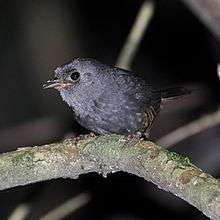Planalto tapaculo
| Planalto tapaculo | |
|---|---|
 | |
| Scientific classification | |
| Kingdom: | Animalia |
| Phylum: | Chordata |
| Class: | Aves |
| Order: | Passeriformes |
| Family: | Rhinocryptidae |
| Genus: | Scytalopus |
| Species: | S. pachecoi |
| Binomial name | |
| Scytalopus pachecoi Maurício, 2005 | |
The Planalto tapaculo (Scytalopus pachecoi) is a small passerine bird belonging to the genus Scytalopus, a genus of tapaculos. It was previously included in the mouse-coloured tapaculo (S. speluncae) but was described as a new species in 2005 based on differences in plumage and vocalizations.
It is about 12 cm long and weighs around 15 grams. The upperparts are mainly dark grey, the underparts are paler grey. The flanks are buff with dark bars. Adult males of the mouse-coloured tapaculo are uniformly dark grey with no flank barring.
The song contains a long series of notes uttered at a rate of two or three per second. This compares to five notes per second in the faster song of the mouse-coloured tapaculo. The Planalto tapaculo has a distinctive, monosyllabic contact call and a loud alarm call.
It is known from southern Brazil (Rio Grande do Sul and Santa Catarina) and north-east Argentina (Misiones Province). It inhabits forest and forest edge where it is often found near streams and in undergrowth such as bamboo thickets. It has been found at higher densities in secondary forest rather than undisturbed forest.
References
Notes
- ↑ BirdLife International (2012). "Scytalopus pachecoi". IUCN Red List of Threatened Species. Version 2013.2. International Union for Conservation of Nature. Retrieved 26 November 2013.
| Wikispecies has information related to Scytalopus pachecoi |
Sources
- Maurício, Giovanni Nachtigall (2005). "Taxonomy of new populations in the Scytalopus speluncae group, with description of a new species and remarks on the systematics and biogeography of the complex (Passeriformes: Rhinocryptidae)". Ararajuba. 13 (1): 7–28.
- "Proposal (#196) to South American Classification Committee: Recognize the newly proposed taxon Scytalopus pachecoi as a species". South American Classification Committee. 2005. Retrieved 19 March 2015.
